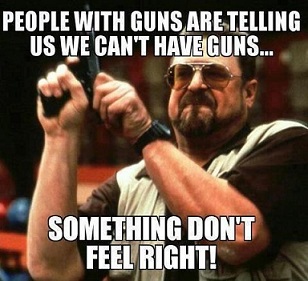
“Making something illegal doesn’t necessarily make it stop happening. If a law is designed to prevent an act which is already illegal and carries a greater penalty than the proposed law, then that law will only be followed by the kind of people who wouldn’t commit the act in the first place.” Grant Cunningham
As Cunningham so aptly puts it – It’s not rocket science – Criminals don’t obey laws. So don’t tell me that new gun control laws are going to reduce or eliminate suicides or murder; that gun free zones are the safest place in the world for our children, or that countries which have banned guns are so much safer than the U.S.
Mexico has some of the strictest gun control laws that ban military calibers outright. Yet nobody in their right mind would claim that Mexico is a “safe” country. Brazil has very strict gun control requiring a license to own a firearm. Despite all of this, they are in the top 20 countries for homicides. Jamaica is another country that requires licensing on firearms & ammunition with yearly renewals. They even allow police to search homes for weapons without a search warrant. And yet, they rank number 5 worldwide in homicide rates. And Europe is no better.
Britain began restricting gun ownership after WWI with the Firearms Act of 1920. Thirteen years later Parliament passed the Firearms and Imitation Firearms Bill making the possession of even a replica gun equally punishable unless the owner could show a lawful purpose for possessing it. That was followed by the Firearms Act of 1937 that extended gun purchase restrictions to shotguns and allowed chief constables the power to add even more conditions to individual private firearm certificates.” By 1997 virtually all handguns were banned with a promise of crime reduction and greater safety.
Obtaining a license to own a firearm is a long and complicated business with every stage of the process designed to reduce the likelihood of factually obtaining one. The criteria are tougher for firearms than shotguns because weapons that fire bullets must only be used for specific purposes in specific places such as deer hunting or sports shooting on an approved range. Shotguns are easier because they tend to be used in rural areas to protect flocks or for pest control.
After the license is completed, officers check the Police National Computer for a criminal record, and then check the applicant for evidence of alcoholism, drug abuse or signs of personality disorders. That is usually followed by a check with friends, relatives or social contacts about your home life and attitude toward guns. If you can make it past the invasion into your personal life, you then must prove you have a secure location to store the firearm which is typically a dedicated gun cabinet. Then if you’re lucky you can get a permit which is good for five years.
Has this made the Brits safe? Not even close! Even after banning most handguns, semi-automatic rifles, pump-action weapons larger than 22’s, and air guns if over a certain power, firearms still make their way into the hands of criminals. In recent years criminals have used antique guns, converted blank-firing pistols, homemade weapons or smuggled modern guns into the country to commit crimes. And those criminals unable to obtain firearms have turned to knives which killed more people in Britain from March 2017 through March 2018 than any previous one-year period on record.
According to the Office for National Statistics nearly 41,000 crimes involving knives or “sharp instruments” were committed in England and Wales in 2018. The report also states that 39% of British homicides in 2018 resulted from stabbings, more than from any other cause. Another 46% of knife crimes were classified as “assault with injury and assault with intent to cause harm.” Another 43% of knife crimes were reported as robberies.
In addition to extending the police’s ability to stop and search individuals for weapons, even without reasonable cause, a number of knee jerk laws have been passed such as a ban on knives with the world “combat” written on the blade, as well as knives that have zombie themes. In addition butterfly knives, disguised knives, switchblades, gravity knives, stealth knives, along with swords with a curved blade, sword sticks, blowpipes, push daggers, batons, throwing stars, claws, etc. are also banned.
It is illegal to sell a knife of any kind (including cutlery and kitchen knives) to anyone under 18; to carry a knife in public without good reason unless the folding blade is 3” or less; to own any banned knife; or to use any knife in a threatening manner. The maximum penalty for an adult is 4 years in prison and an unlimited fine. You’ll get a heavier sentence if convicted of carrying a knife more than once.
But just like gun bans don’t prevent criminals from obtaining guns or using them, knife bans haven’t prevented crimes from being committed with knives nor will they stop people from using other weapons.
The UK has one of the highest rates of acid attacks per capita in the world, according to Acid Survivors Trust International (ASTI). Criminologists believe gang members may be swapping guns and knives for acid as a weapon of choice because possession is hard to monitor. While there are rules that limit the sale of certain substances under the explosives precursors and poisons rules, there are no age restrictions on buying household bleach or drain cleaning products containing acid.
Criminals don’t abide by the laws of our society. It is this very fact that makes them criminals.
Source: Study: ‘Assault Weapons’ and Magazine Bans Do Not Lower Homicide Rates, Breitbart; Acid attacks: What has led to the rise and how can they be stopped?, BBC News

